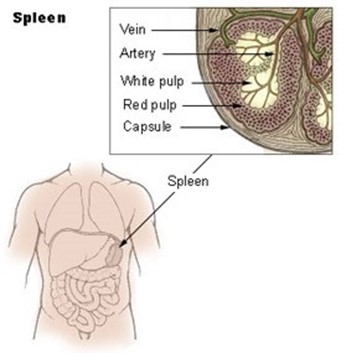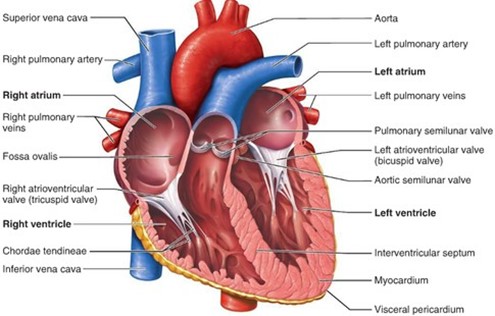The spleen:
Resembles a large lymph node divided into lobules.
Produces T lymphocytes.
Filters lymph.
Consists of two lobes and is located in the mediastinum.
The Correct Answer is A

It is a major component of the lymphatic system and contains T and B lymphocytes.
Choice B is wrong because the spleen does not produce T lymphocytes, but rather stores them.
T lymphocytes are produced in the thymus.
Choice C is wrong because the spleen does not filter lymph, but rather blood. It traps bloodborne microbes and produces an immune response to them.
Choice D is wrong because the spleen consists of one lobe and is located in the upper left abdomen below the diaphragm.
The description in choice D matches the thymus, not the spleen.
The normal size of the spleen in adults is about 12 cm long, 8 cm broad, and 3-4 cm thick, weighing about 200 g.
The normal range of splenic index (the product of length, width, and thickness) is 120-480 cm.
Nursing Test Bank
Naxlex Comprehensive Predictor Exams
Related Questions
Correct Answer is A
Explanation
The right atrium receives blood directly from the superior vena cava, inferior vena cava, and coronary sinus.

The superior vena cava and inferior vena cava bring deoxygenated blood from the upper and lower body, respectively.
The coronary sinus brings blood from the heart muscle.
Choice B is wrong because it excludes the coronary sinus, which also empties into the right atrium.
Choice C is wrong because it includes the pulmonary veins, which carry oxygenated blood from the lungs to the left atrium, not the right atrium.
Choice D is wrong because it only includes the pulmonary veins, which are not connected to the right atrium at all.
Correct Answer is B
Explanation
Monocytes are a type of agranulocytes, which are white blood cells that lack visible granules in their cytoplasm.
Agranulocytes also include lymphocytes, which are involved in adaptive immunity.
Choice A is wrong because basophils are a type of granulocytes, which are white blood cells that have granules in their cytoplasm.
Granulocytes also include neutrophils and eosinophils, which are involved in innate immunity.
Choice C is wrong because neutrophils are also a type of granulocyte.
Neutrophils are the most abundant white blood cells and are responsible for phagocytizing bacteria and fungi.
Choice D is wrong because eosinophils are also a type of granulocytes. Eosinophils are involved in allergic reactions and parasitic infections.
Normal ranges for white blood cells vary depending on age, gender, and health status, but generally, they are between 4,000 and 11,000 cells per microliter of blood.
Whether you are a student looking to ace your exams or a practicing nurse seeking to enhance your expertise , our nursing education contents will empower you with the confidence and competence to make a difference in the lives of patients and become a respected leader in the healthcare field.
Visit Naxlex, invest in your future and unlock endless possibilities with our unparalleled nursing education contents today
Report Wrong Answer on the Current Question
Do you disagree with the answer? If yes, what is your expected answer? Explain.
Kindly be descriptive with the issue you are facing.
